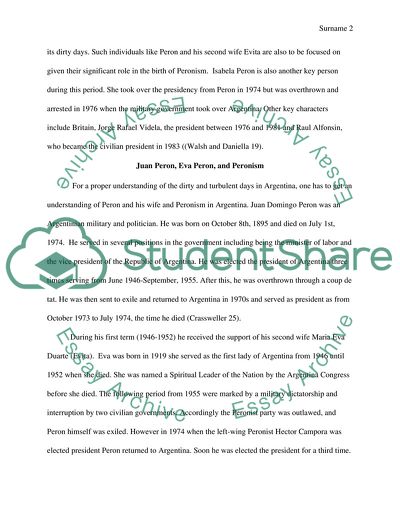Cite this document
(Why Peronism, and the Argentine Dirty War Are Relevant to History Case Study Example | Topics and Well Written Essays - 2250 words, n.d.)
Why Peronism, and the Argentine Dirty War Are Relevant to History Case Study Example | Topics and Well Written Essays - 2250 words. https://studentshare.org/military/1877901-why-juan-peron-peronism-and-the-argentine-dirty-war-are-important-to-history
Why Peronism, and the Argentine Dirty War Are Relevant to History Case Study Example | Topics and Well Written Essays - 2250 words. https://studentshare.org/military/1877901-why-juan-peron-peronism-and-the-argentine-dirty-war-are-important-to-history
(Why Peronism, and the Argentine Dirty War Are Relevant to History Case Study Example | Topics and Well Written Essays - 2250 Words)
Why Peronism, and the Argentine Dirty War Are Relevant to History Case Study Example | Topics and Well Written Essays - 2250 Words. https://studentshare.org/military/1877901-why-juan-peron-peronism-and-the-argentine-dirty-war-are-important-to-history.
Why Peronism, and the Argentine Dirty War Are Relevant to History Case Study Example | Topics and Well Written Essays - 2250 Words. https://studentshare.org/military/1877901-why-juan-peron-peronism-and-the-argentine-dirty-war-are-important-to-history.
“Why Peronism, and the Argentine Dirty War Are Relevant to History Case Study Example | Topics and Well Written Essays - 2250 Words”. https://studentshare.org/military/1877901-why-juan-peron-peronism-and-the-argentine-dirty-war-are-important-to-history.


